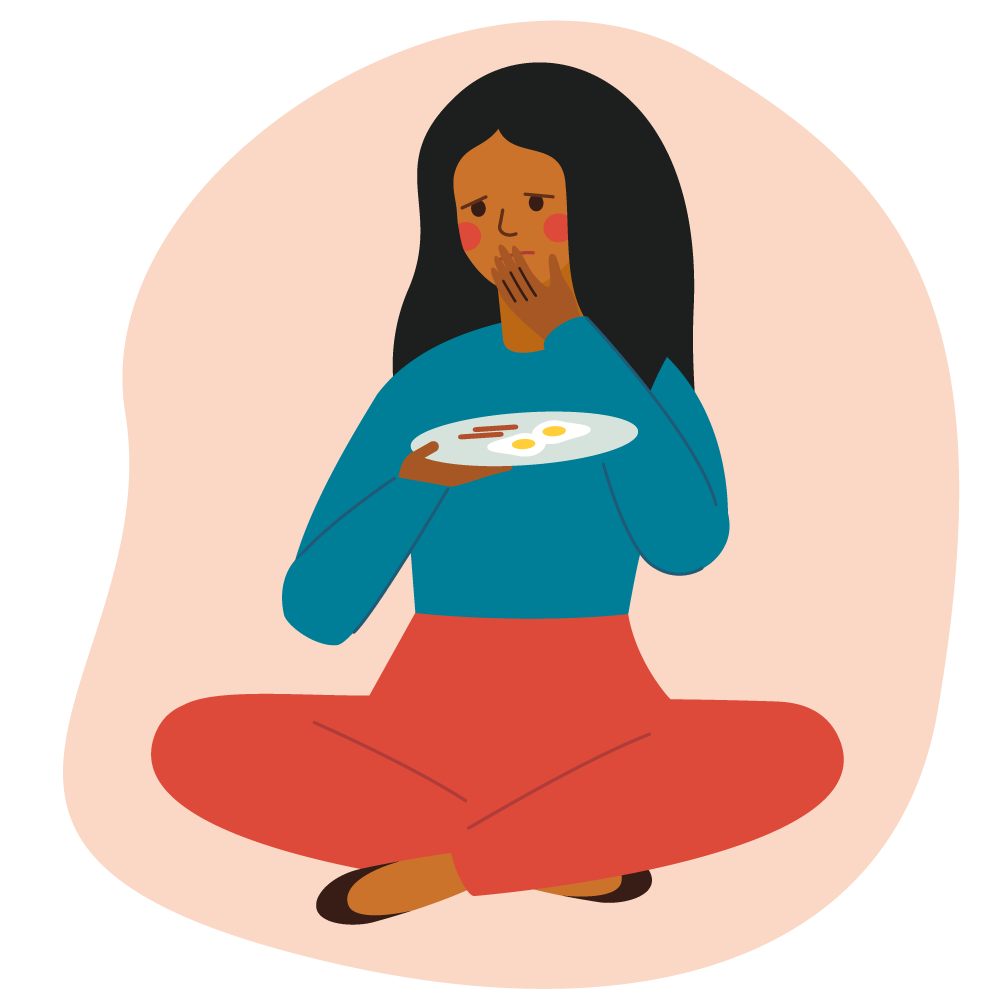ARFID Therapy near Marietta, Roswell & Atlanta
Find relief from stress and anxiety related to Avoidant Restrictive Food Intake Disorder with specialized ARFID Therapy.


Are You Or Your Child Struggling With ARFID?
- Do you or your child experience intense anxiety or discomfort around certain foods, leading to a limited variety in meals?
- Has avoiding certain foods made social situations stressful or isolating for you or your child?
- Are you or your child frequently preoccupied with thoughts about eating, food textures, or flavors, impacting daily activities?
If you or a loved one is preoccupied with avoiding certain foods, you might be dealing with Avoidant/Restrictive Food Intake Disorder (ARFID). This condition often stems from sensory sensitivities, such as strong reactions to food textures, tastes, or smells, which can make even the thought of eating distressing.
Negative past experiences, like a traumatic choking incident or severe food poisoning, can also contribute to an aversion to certain foods. As a result, mealtimes can become sources of significant anxiety and stress, leading to a narrow diet that lacks essential nutrients.
Your Relationship with Food Might Be All-Consuming
Maybe you notice that you:
- Experience intense anxiety or disgust around certain foods or food textures.
- Limit your diet to a small range of familiar items, avoiding new foods.
- Feel overwhelmed in social situations that involve food.
- Use food to cope with stress or emotional difficulties.
- Experience guilt or shame after eating or trying new foods.
These struggles can severely impact mental and physical health, leading to nutrient deficiencies and social withdrawal. The emotional toll can also manifest in increased anxiety, depression, or feelings of isolation, making it even harder to engage with others. Fortunately, ARFID eating disorder therapy can help you break free from this cycle and rediscover the joy of eating.
Through therapy, you can learn effective coping strategies, gradually expand your food preferences, and reclaim your social life, creating a healthier and more fulfilling relationship with food. With support, it’s possible to approach mealtimes with curiosity and joy rather than fear.
Contact Us
Have a question? Feel free to reach out to us using our contact form.
Understanding ARFID and Its Impact
Accoridng to the National Eating Disorders Association (NEDA), "Studies have found that between 0.5%-5% of children and adults in the general population have ARFID." [1] Unlike picky eating, ARFID involves significant anxiety and distress related to food, leading to limited dietary choices and potential nutritional deficiencies. Those with ARFID may experience intense fear or aversion to certain foods, which can stem from sensory sensitivities, traumatic eating experiences, or underlying anxiety disorders.
The impact of ARFID extends beyond just food; it can lead to social withdrawal, affecting relationships with family and friends. The constant anxiety surrounding eating can result in feelings of shame and frustration, further perpetuating the cycle of avoidance. Recognizing ARFID as a serious eating disorder is essential, as therapy can help individuals develop healthier coping mechanisms and gradually introduce new foods, fostering a more positive relationship with food.
 Cultural and Societal Contributions to ARFID
Cultural and Societal Contributions to ARFID
Our culture often places a strong emphasis on food, making it a central aspect of social gatherings and celebrations. This focus can heighten anxiety for individuals with Avoidant/Restrictive Food Intake Disorder (ARFID), as they may feel immense pressure to conform to social norms surrounding eating. In a society that frequently glorifies certain foods and diets, individuals with ARFID may struggle even more, feeling isolated and judged for their food choices. The stigma associated with eating disorders can prevent open discussions about food anxieties, leading those affected to suffer in silence.
Additionally, the influence of social media has intensified the scrutiny of food choices and body image, creating unrealistic standards that many feel compelled to meet. Images of perfect meals and bodies can exacerbate feelings of inadequacy and fear around eating, particularly for those with ARFID. This environment fosters a culture of comparison, making it difficult for individuals to embrace their unique relationship with food. As a result, the cycle of anxiety and avoidance may worsen, further complicating their ability to seek help and recover.

ARFID Therapy Can Change Your Relationship with Food
As therapists experienced in treating Avoidant/Restrictive Food Intake Disorder (ARFID), we understand that you or your child may feel hesitant about starting therapy. The thought of confronting food challenges and altering your established routines can be daunting. However, your counselor will meet you where you are and guide you through the process with compassion and tailored strategies that honor your unique journey.
As therapists, we strive to be person-centered, strengths-based, and collaborative. We will discuss what works and doesn’t work for you and decide on the next steps together. Our goal will be to get you to a place where feel ready to let go of unhealthy habits and behaviors and make changes that will benefit you in the long term.
The Modalities We Use in ARFID Treatment
Using evidence-based therapeutic approaches such as Cognitive Behavioral Therapy (CBT), talk therapy, and exposure therapy, our therapists can support you in addressing your food challenges. CBT helps you recognize and change negative thoughts and behaviors related to food. By identifying unhelpful patterns, you can begin to shift your relationship with specific foods and eating as a whole.
Talk therapy provides a safe space for you to express your feelings and fears related to food, helping to uncover underlying issues and fostering a greater understanding of your challenges. Additionally, exposure therapy is particularly beneficial for gradually introducing new foods into your diet. We will work at a pace that feels comfortable for you, helping you confront and overcome specific food fears without overwhelming you.
By taking a holistic view of your experiences, we can better understand the origins of your food challenges and develop effective strategies for recovery. Together, we can help you move past your fears and embrace a more varied and enjoyable relationship with food
Imagine if you could…

- Enjoy meals without fear or anxiety;
- Expand your food choices and embrace new flavors and textures;
- Build stronger connections with family and friends around food;
- Develop a healthier self-image and relationship with your body;
- Feel empowered to explore life beyond food-related worries.
Our Comprehensive Approach to ARFID
At Awaken Counseling, we tailor our approach to meet your unique needs through ARFID therapy. We collaborate with dietitians and other healthcare professionals to ensure a holistic treatment experience. Together, we can help you gain a deeper understanding of your relationship with food and navigate the challenges of ARFID, distinguishing it from common picky eating behaviors.
But Maybe You’re Not Sure If ARFID Therapy Is Right For You…
As therapists, we are trained to be understanding and non-judgmental. We recognize that seeking help can be challenging, and we’re here to support you through it. During our sessions, we will take the time to understand what you’re experiencing and help you gain insights into your feelings.
Our goal is to create a safe space where you can explore your concerns and work towards relief.
Yes, our therapists are trained in treating ARFID and other food-related anxieties. We utilize evidence-based approaches, including Cognitive Behavioral Therapy (CBT) and Exposure and Response Prevention (ERP).
Cognitive Behavioral Therapy (CBT) focuses on identifying and changing negative thought patterns and behaviors related to food. This helps you develop healthier perspectives and coping strategies.
Exposure and Response Prevention (ERP) is particularly effective for reducing anxiety. It involves gradually exposing you to the foods or situations that cause anxiety while helping you learn to manage your responses to them.
In your initial sessions, we will assess your history and experiences to better understand the root of your concerns. This comprehensive evaluation allows us to tailor our approach specifically to your needs, ensuring the best path forward for your treatment. If you have any more questions, feel free to ask!
Absolutely, therapy can be very beneficial for addressing anxiety around food, even if you don't have Avoidant/Restrictive Food Intake Disorder (ARFID). Many people experience anxiety related to food for various reasons, such as aversions, body image concerns, or even issues connected to obsessive-compulsive disorder (OCD).
During your first session, we'll conduct a thorough assessment to understand your specific experiences and the nature of your anxiety. This helps us tailor a treatment plan that best suits your needs. We'll explore your feelings about food, any triggers you may have, and how these impact your daily life.
Our goal is to provide a supportive environment where we can work together to develop strategies that help you feel more comfortable and confident around food. If you have any questions or would like to learn more, we're here to help!
Food Doesn’t Have To Control Your Life
It's possible to find relief from the stress and anxiety around food. If you would like to find out more about ARFID therapy with Awaken Counseling, you can click here to schedule a free 15-minute call.
Sources:
[1] https://www.nationaleatingdisorders.org/avoidant-restrictive-food-intake-disorder-arfid/
Need some advice? We made this content just for you.

 Cultural and Societal Contributions to ARFID
Cultural and Societal Contributions to ARFID




